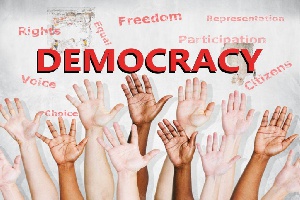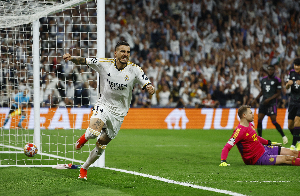Opinions of Thursday, 16 February 2023
Columnist: William Nambie
Political leadership and democratic governance - the hidden danger of our time?
‘We hang the petty thieves and appoint the great ones to public office’-Aesop
Democratic governance cannot succeed and flourish anywhere in the global village if the structures and systems operating it are not appealing and adjusting to the values, traditions, aspirations, culture et cetera of the citizens it is meant to serve.
These structures and systems include among others:
(I) The constitutional Provisions
(II) the performance of the political office holders and their leaders; and
(III) issues pertaining to the behavior of the citizens in general. Around the world, many countries, including Ghana, have adopted and are practicing democratic governance for nation-building.
Democracy however entails more than just voting to elect political leaders to run the affairs of a country. It includes such other aspects as the economy and the economic well-being of the people, human rights, freedom of expression, freedom of the media, right to form associations and freedom of speech among others.
However, it is pertinent to mention that, there is no known perfect democracy anywhere in the world.
All democracies around the world started in a crude form, but through some political reforms over the years, and out of practical experiences, they are refined or developed through the incorporation of traditional values, beliefs, and customs in the constitution of various countries around the world. Indeed, effective and successful democratic governance is premised on the situation prevailing within any given country.
This implies that political leadership should be considered situational and not on the personal imaginations of the politicians or the political class of any given country.
POLITICAL LEADERSHIP
This being the case, political leaders need to understand and truly appreciate the fact that no one particular leadership style is suitable for all situations or better still there is no one fit for all approach when it comes to leadership styles.
Good leadership is one that is able to do what the situation demands and the ability and skill to satisfy the generality of the citizenry. As governors of the governed, political leaders should do whatever it takes to avoid citizens losing their trust, faith, confidence, and hope in order not to turn it into a revolt. For it has been said that rebellion is anger in motion.
THE TYPICAL GHANAIAN SITUATION
The inability of leaders to assess and thoroughly analyze the country’s situation is a major setback for all and sundry including the political class. Even though political leaders in Ghana appear to have developed that psychological identity with their nationality symbol, this is not manifested or reflected in their actions and behaviors.
They are rather more loyal to their political parties than the state.
Consequently out of suspicion and mistrust for each other, the two major parties in Ghana, that is the National Democratic Congress (NDC) and the New Patriotic Party (NPP) have unfortunately engaged themselves in a struggle that can best be described as ‘political vendetta’, which is strongly believed to doing more harm than good to the country. None sees any good whatsoever in what the other is doing in building the nation Ghana.
SOME ADVERSE EFFECTS OF POLITICAL VENDETTA
This could be seen in various forms and it is eating deep into the national psyche of the country. This includes but not limited to the following:
(1) Needless, senseless and unnecessary politicization of state institutions, and indeed its general application to the Ghanaian public, which weakens institutional capacity to perform their mandates as required by them and the law.
(2) The abandonment of uncompleted development projects of predecessor governments by successor governments leaves a sour taste in the mouth of the average observer. A typical example includes affordable housing projects, state infrastructures such as hospitals, roads, even in some cases vehicles.
Meanwhile, these projects were put up with borrowed funds from the international capital market, and to be paid for with interest needless to add that they are often financed by government of Ghana sources.
But the constitution at article 35(7) under the directive principles of state policy made it clear that ‘As far as practicable, a government shall continue and execute projects and programmes commenced by the previous Governments’. Is this not a shame that this constitutional provision has been flouted with impunity one can imagine?
(3). Excessive borrowing to fulfill excessive promises made with malicious political propaganda, to win votes during electioneering campaigns has been the order of the day.
(4) Self-gratification of these two dominant political parties of NDC and NPP, indulging in self-adulation by praising themselves immensely for their achievements while in power in some cases praising themselves for no work done.
This is tantamount to a judge judging himself while sitting on a case. It is an abnormality in a decent democratic governance system.
Why these two dominant parties of NDC and NPP won’t let the citizens rain praises on their development agenda, they rather praise themselves for a good job done as the proverbial lizard falling from a height.
For, no matter how much prominence a praise singer gains, if ever he is seen calling his own appellations publicly and dancing to the accompanying tunes, he has become abnormal as the adage would have it.
(5). Vote purchasing or buying which is becoming the norm as it manifests in unusual monetary and other material gifts thereby monetizing the political system of the country. This is done with the hidden intention in order to induce eligible voters to vote for their candidates in an election to win power political power.
This phenomenon has succeeded in bringing some people with no integrity getting into Ghana’s legislature and other leadership positions. What a naked corrupt practice in democratic governance!
Indeed, Ghana has what it takes:
To make it a self-made country;
To become self-sustainable;
To be self-reliant;
To become economically independent;
To be self-confident, and
To be respectable in the global society or community.
But because the lust or love for money has become the precursor for massive and pervasive corruption which in turn has become a potent and insidious cankerworm, that has eroded the moral fabrics of the larger segment of the Ghanaian community.
Ghana has been unable to achieve the aforementioned attributes or qualities for obvious reasons. Hence, the need to go back to the International Monetary Fund (IMF) and the Breton Wood Institutions the eighteenth (18th) time for an economic bailout.
(6). The inability of any of the two dominant parties of NPP and NDC to adequately resource government or public institutions both financially and logistically to carry out their constitutionally mandated functions since the inception of the fourth republic is a major setback for the proper functioning of the country.
(7). The failure of political leadership of Ghana to recognize that changing situations in any country demands corresponding changes in leadership style to suit the changing situation locally is another worrying situation.
CONCLUSION
The enemies of Ghana’s economic woes include:
(1) Pervasive corruption;
(2). Senseless and unnecessary over-politicization of almost everything in the Ghanaian community;
(3). Gross under-resourcing of government institutions by successive governments, financially and logistically, since the inception of the 1992 constitution.
The situation has rendered them weak. They are therefore unable to perform their constitutional mandates well due to poor implementation of government policies and programmes.
Although all state policies are politically determined objectives, the politicians do not directly implement the policies why won’t the political class resource various government institutions to run around financially for fuller implementation of government programmes and policies as that t is the job of all state institutions?
Indeed, between the summit and the base of a mountain, there are so many intermediaries. Therefore, if Ghana cannot be an economic giant like others in the global economic space, it has no good reasons to be an economic dwarf as is the case currently.
Ghana going to the International Monetary Fund (IMF) the eighteenth (18th) time is a disgrace and a complete betrayal of Dr. Kwame Nkrumah’s proclamation that: “Blackman is capable of managing his own affairs”.
Not for no reason that a dove flees its nest in the dense canopy of a tree around midnight. “That is a sign of an imminent danger”. So, therefore, the numerous strikes and demonstrations in Ghana in recent times are a perfect illustration of the above adage. According to Eleanor Everet ‘For safety is not a gadget but a state of mind’.
Again chapter one of the 1992 constitution of Ghana which is the supreme law of the land states that ‘The sovereignty resides in the people of Ghana in whose name and for whose welfare the power of government is exercised in the manner and within the limits laid down in this constitution’.
THINGS WORTH NOTING
(1) The popular will of the people of the citizens of Ghana cannot be perpetually suppressed; as rebellion is anger in motion
(2). Public perception remains the truth unless and until it is disproved;
(3) An edifice erected with sputum will be demolished by the early morning dew;
(4). A country without discipline is like a vehicle without brakes, and tends to “make nation-building as difficult as it is for an expert swimmer to swim upstream in a swift current”.
In the not-too-far-distant future, Africans will become the economic slaves of the global village, if the continent’s political leaders do not cease exchanging their human and natural resources for mouthfuls of beans from the so-called developed economies and countries.
In Ghana for instance, the Chinese are here in their numbers, engaging in illegal mining, polluting our rivers and other water bodies, degrading our environment, and destroying our cocoa farms, with the active connivance of some Ghanaians.
Such activity is undermining and destroying our economic base to build China’s economy. Where is the economic wisdom in such a situation? And politicians, who recklessly misuse the power given them by the people with impunity, are worse than a mad man roaming the street with a deadly weapon in his hands.













